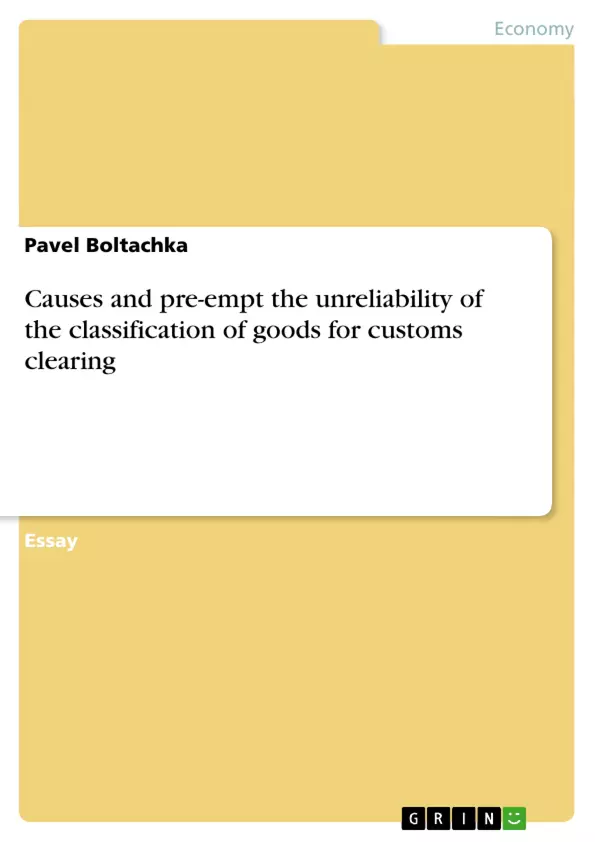Thus, we are faced with the following objectives:
• determination of the place HS Republic of Belarus in the field of customs policy;
• determination of the causes of false classification of goods;
• search for methods of control and prevention of false classification of goods.
To achieve these objectives it is necessary to analyze how the international legal acts and acts of national legislation.
The Republic of Belarus is committed to actively participate in international cooperation in the field of customs, which develops in the direction of harmonization and unification with generally accepted international norms and practices.
Inhaltsverzeichnis (Table of Contents)
- Causes and Pre-empt the Unreliability of the Classification of Goods for Customs Clearing
- Objectives and Key Themes
- Determination of the Place of the HS Republic of Belarus in the Field of Customs Policy
- Determination of the Causes of False Classification of Goods
- Search for Methods of Control and Prevention of False Classification of Goods
- The Importance of Accurate Classification
- Classification of Goods in the Republic of Belarus
- Legal Importance of Accurate Classification
- Causes of False Classification
- Aimed Reasons
- Random Factors
- Methods for Pre-Emption of False Classification
- Risk Management System (RMS)
- Full Harmonization of Regulations
- Training Method
Zielsetzung und Themenschwerpunkte (Objectives and Key Themes)
The paper examines the challenges of inaccurate classification of goods for customs clearance, aiming to understand its causes and explore effective methods for prevention. It delves into the importance of accurate classification in relation to customs policy and the economic and legal implications of misclassification. The paper also investigates the role of the Harmonized System (HS) and the impact of different regulatory measures on the classification process.
- Importance of Accurate Classification in Customs Policy
- Causes of False Classification of Goods
- Methods for Pre-Empting False Classification
- Role of the Harmonized System (HS) in Customs Procedures
- Impact of Non-Tariff Regulation on Classification
Zusammenfassung der Kapitel (Chapter Summaries)
The paper initially defines the role of accurate classification of goods in customs policy, highlighting its impact on customs duties, non-tariff regulations, and foreign trade statistics. It outlines the key objectives and themes of the study, focusing on the determination of the causes of false classification and the identification of preventative measures. The study analyzes the significance of the HS in the Republic of Belarus, emphasizing its role in trade negotiations and the regulation of foreign economic activities. The paper then delves into the factors contributing to incorrect classification, categorizing them as aimed reasons (intentional attempts to evade customs regulations) and random factors (unintentional misclassification due to terminology discrepancies or knowledge gaps). The study explores the role of the Harmonized System in the Republic of Belarus and its impact on the calculation of customs duties and the application of non-tariff measures. The study concludes with a detailed analysis of methods for preventing false classification, focusing on the application of risk management systems, full harmonization of regulations, and comprehensive training programs. The paper highlights the importance of collaboration between customs authorities and businesses to ensure the accurate classification of goods and enhance the effectiveness of customs procedures.
Schlüsselwörter (Keywords)
This paper focuses on the key concepts of classification of goods, customs policy, Harmonized System (HS), non-tariff measures, risk management, and training programs in the context of international trade in the Republic of Belarus. It explores the challenges of inaccurate classification, analyzes its causes, and proposes solutions for its prevention.
Frequently Asked Questions
What is the Harmonized System (HS) in customs?
The HS is an international standardized system of names and numbers to classify traded products, used by customs authorities worldwide.
Why is accurate classification of goods important?
It determines the correct customs duties, helps in applying non-tariff regulations, and ensures accurate foreign trade statistics.
What are the main causes of false classification?
Causes include intentional evasion of taxes (aimed reasons) and unintentional errors due to complex terminology or lack of training (random factors).
How can a Risk Management System (RMS) help?
An RMS identifies high-risk shipments and goods prone to misclassification, allowing customs to focus their inspections more effectively.
What role does training play in preventing misclassification?
Comprehensive training for both customs officials and businesses reduces random errors caused by knowledge gaps and technical discrepancies.
- Citar trabajo
- Pavel Boltachka (Autor), 2011, Causes and pre-empt the unreliability of the classification of goods for customs clearing, Múnich, GRIN Verlag, https://www.grin.com/document/264698



